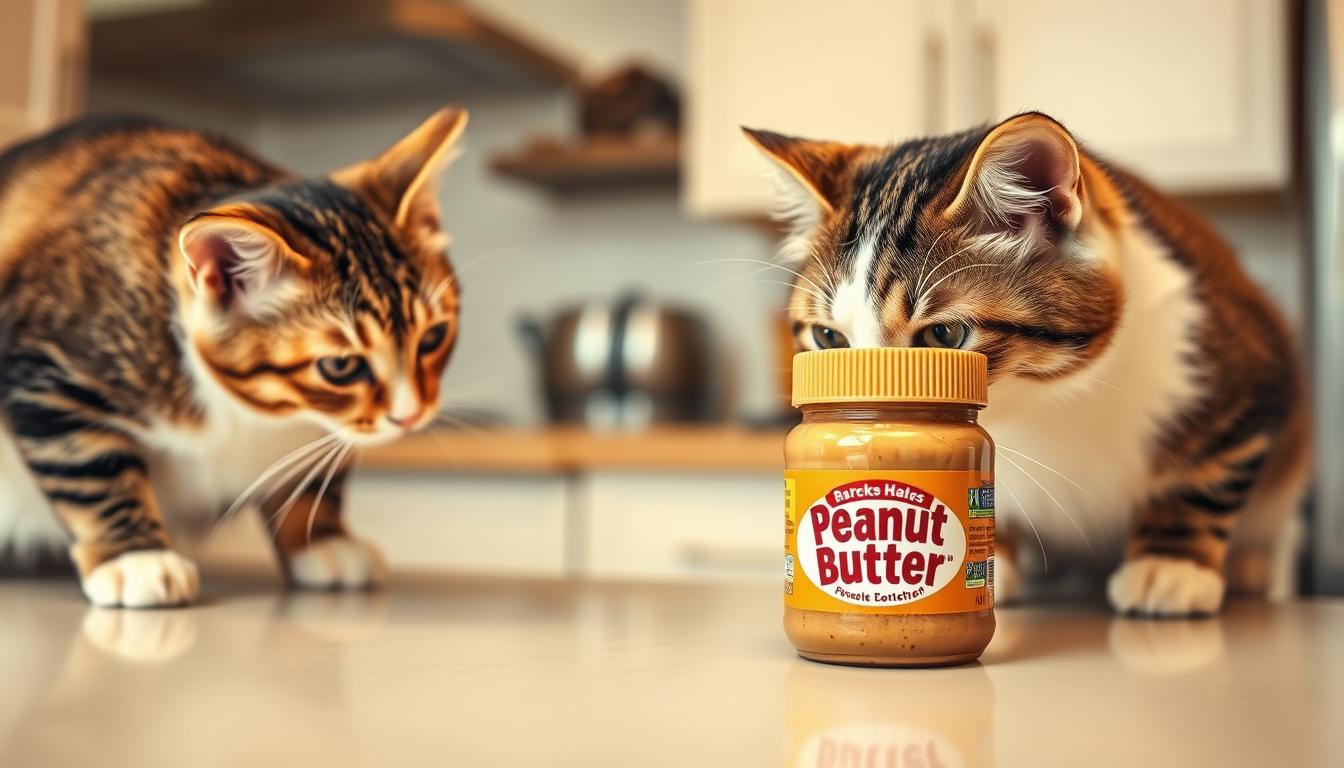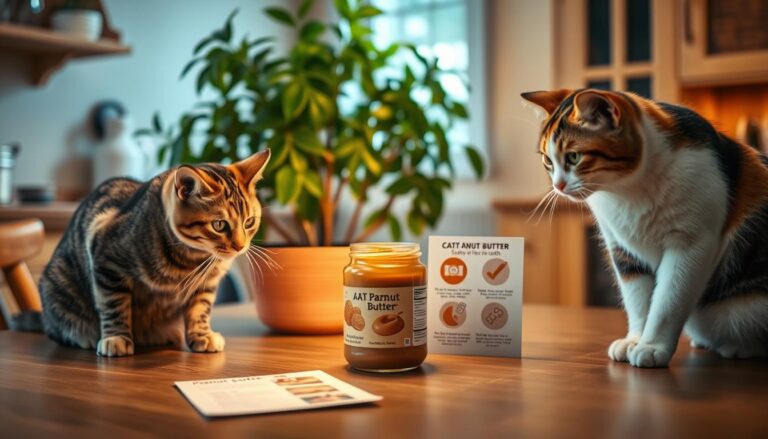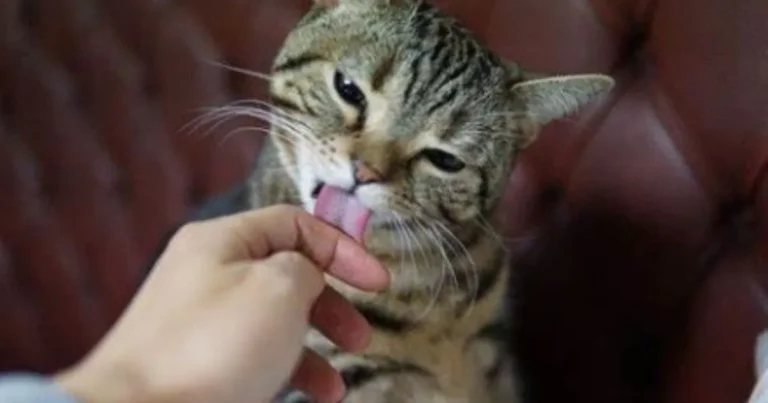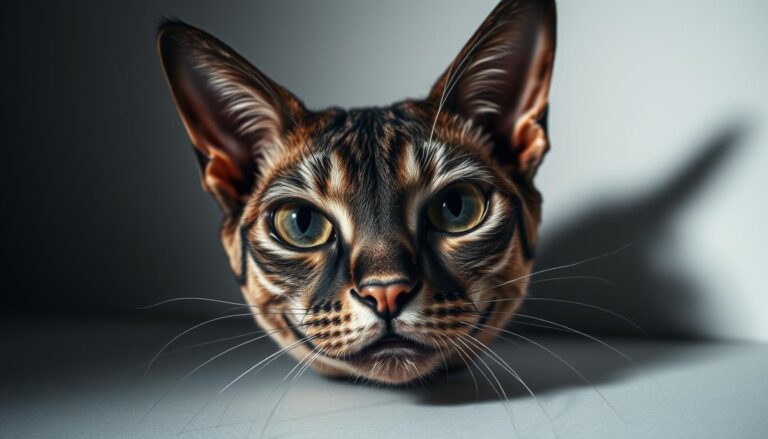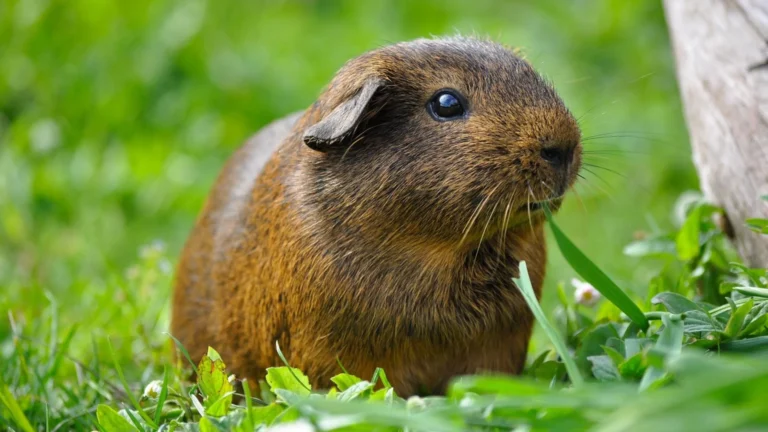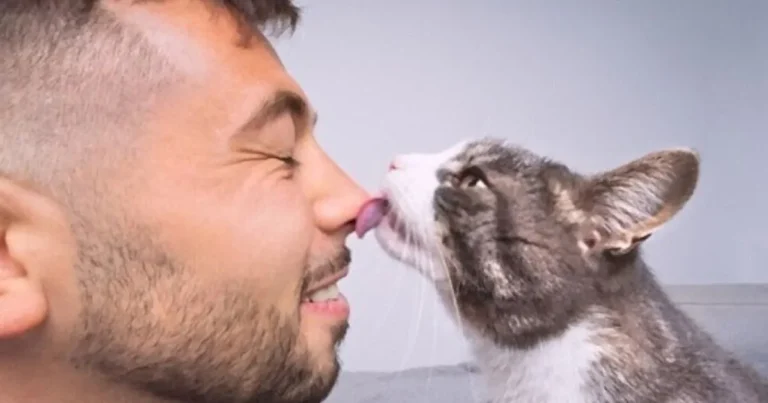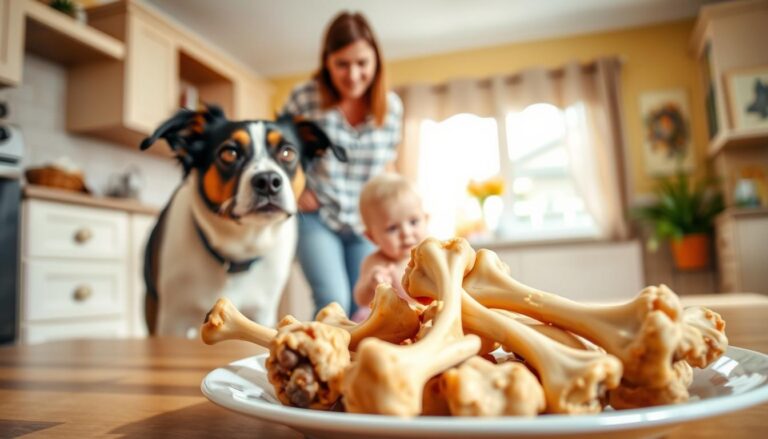Can Cats Have Peanut Butter? What Every Pet Owner Should Know
I remember my cat eyeing my peanut butter sandwich. I wondered if cats can have peanut butter safely. It’s important for cat owners to know the risks and what’s good for their pets.
Peanut butter might look like a tasty treat for cats. But not all human foods are good for them. Cats have different dietary needs than humans. It’s smart to check if peanut butter is safe for them.
This guide will tell you all about cats and peanut butter. We’ll look at the risks, what’s good for them, and safe alternatives. This way, you can make the best choices for your cat’s diet.
Vets always say to be careful with human food for cats. While peanut butter isn’t toxic, it can still be harmful. Let’s explore the key facts to keep your cat safe and healthy.
Table of Contents
Understanding the Basics of Peanut Butter and Cats
Exploring the link between cats and human food is key. Cats have unique dietary needs that differ from ours. This makes some foods bad for their health.
What Makes Up Commercial Peanut Butter
Commercial peanut butter often has ingredients that are not safe for cats. It usually includes:
- Roasted peanuts
- Added salt
- Sugar
- Preservatives
- Potential artificial sweeteners
The Role of Cats as Obligate Carnivores
Cats are obligate carnivores. Their bodies are made to digest animal proteins. Unlike humans, cats need a diet rich in meat.
Natural Feline Dietary Requirements
Cats need high-protein, meat-based foods. Their digestive system can’t handle plant proteins or carbs found in peanut butter. Always choose protein-rich, meat-based foods for them.
“Cats require a specialized diet that reflects their evolutionary predatory nature.” – Veterinary Nutrition Experts
Knowing these dietary basics helps pet owners make better choices for their cats. It keeps them safe from harmful human foods.
Can Cats Have Peanut Butter: Safety and Risks
Feeding cats human foods like peanut butter can be risky. It’s not toxic right away, but it can still harm your cat’s health. This is because it can upset their digestive system and balance.
It’s important to know which foods are bad for cats. Peanut butter has things in it that can hurt your cat’s stomach and diet.
- Choking hazard due to thick, sticky texture
- High fat content leading to potential obesity
- Potential allergic reactions
- Risk of harmful artificial additives
Cats need certain foods to stay healthy. Eating peanut butter can mess with their diet. It might also cause stomach problems.
| Risk Factor | Potential Impact |
|---|---|
| Fat Content | Weight gain and pancreatitis |
| Artificial Sweeteners | Potential toxicity, especially xylitol |
| Digestive Stress | Potential gastrointestinal upset |
If you want to give your cat peanut butter, talk to your vet first. They can help decide if it’s safe for your cat based on their health and diet.
Hidden Dangers in Peanut Butter Ingredients
When thinking about cats and peanut butter, it’s key to know the dangers. Not all peanut butter is safe for cats. Some ingredients can really harm their health.
Xylitol: A Dangerous Sweetener
Xylitol is a sweetener found in some peanut butters. It’s very bad for cats. Even a little can cause a big drop in blood sugar. This can lead to:
- Sudden insulin release
- Potential liver failure
- Seizures
- Severe hypoglycemia
Salt and Sugar Risks
Many peanut butters have too much salt and sugar. These can hurt your cat’s health a lot. They can cause:
- Electrolyte imbalances
- Dehydration
- Weight gain
- Increased diabetes risk
Fat Content Concerns
Peanut butter is very calorie-dense. Cats need certain nutrients that human foods don’t provide. Eating too much fat can lead to:
- Obesity
- Pancreatitis
- Digestive issues
- Potential long-term metabolic problems
Always consult with your veterinarian before introducing any human food to your cat’s diet.
Health Risks Associated with Feeding Peanut Butter to Cats
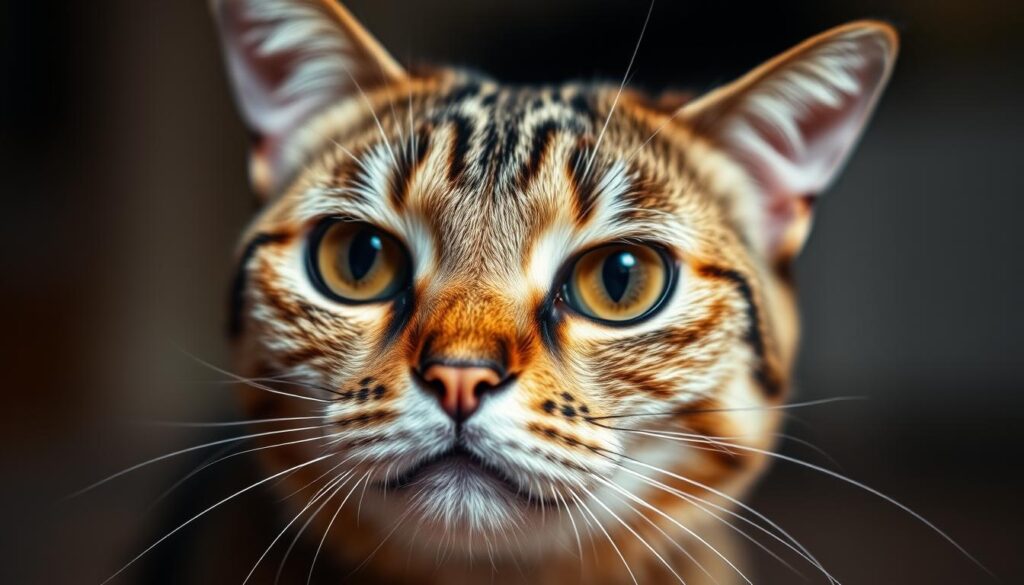
Feeding peanut butter to cats can cause serious health problems. Pet owners need to think carefully before giving it to them. Cats might seem to like it, but the risks are too great.
Cats need a diet that is high in meat. Eating peanut butter can lead to several serious health issues:
- Gatrointestinal distress and upset stomach
- Potential development of pancreatitis
- Risk of rapid weight gain and obesity
- Possible allergic reactions
- Choking hazard due to sticky texture
Digestive problems are a big worry with cats and human food. Peanut butter’s high fat can upset a cat’s stomach. Cats can’t digest foods like peanut butter well.
Feeding cats treats like peanut butter can also lead to obesity. A small amount of peanut butter has a lot of calories. Vets say to stick to cat food and avoid treats.
Your cat needs special food for their health. Always talk to your vet before adding new foods. This helps keep your cat healthy and avoids health problems.
Signs of Peanut Butter Intolerance in Cats
Knowing about cat health means spotting signs of bad reactions to foods like peanut butter. Giving cats human foods might seem okay, but some cats can have big problems with peanut butter. They might get sick or have allergies.
Immediate Reactions to Watch For
When cats eat peanut butter, they might show signs of not being able to handle it:
- Sudden vomiting or repeated retching
- Persistent diarrhea
- Unusual lethargy or weakness
- Difficulty breathing or wheezing
- Excessive drooling
- Skin irritations or sudden itching
Long-term Health Complications
Regularly eating peanut butter can cause bigger health problems in cats, like:
- Weight gain and potential obesity
- Increased risk of diabetes
- Potential digestive tract inflammation
- Dental problems from sugar content
When to Contact Your Veterinarian
If your cat shows severe or prolonged symptoms after eating peanut butter, see a vet right away. A vet can help keep your cat safe and avoid long-term health issues from bad feeding.
Safe Serving Practices and Portion Control
Feeding cats human food like peanut butter needs careful control. Their diet should focus on protein and foods they naturally eat. If you do give them peanut butter, make sure it’s in very small amounts.
Before adding human food to your cat’s diet, remember these important steps:
- Choose only plain, unsalted peanut butter
- Stay away from brands with xylitol or artificial sweeteners
- Give only pea-sized amounts
- Use it as a very rare treat, not a regular meal
Cats need a diet rich in protein because they are meat-eaters. Peanut butter should not be a main part of their diet. Treats should be given in small amounts, like a pea, but not often.
Remember: Your veterinarian is the best resource for personalized dietary advice for your specific cat.
For giving medicine or treats, look for vet-approved options. These are safer for cats and follow food safety rules. Always put your cat’s health first when choosing their food.
Healthier Alternatives to Peanut Butter for Cats
Choosing the right treats for cats is key to keeping them healthy and well-nourished. While peanut butter might be tempting, there are better choices that fit a cat’s diet.
When picking out your cat’s food, think carefully. Look for protein-rich options that are both tasty and nutritious for your cat.
Protein-Rich Treat Options
- Small pieces of cooked chicken
- Plain, unseasoned fish like salmon or tuna
- Lean, cooked turkey
- Commercially prepared meat-based cat treats
Veterinarian-Approved Snack Alternatives
These safe options are good for your cat and offer health benefits:
| Treat Type | Nutritional Benefits | Serving Recommendation |
|---|---|---|
| Freeze-dried meat treats | High protein, low carbohydrates | 1-2 small pieces per day |
| Bonito fish flakes | Rich in omega-3 fatty acids | Sprinkle sparingly |
| Commercial dental treats | Supports dental health | Follow package instructions |
Commercial Cat Treats vs. Human Food
Commercial cat treats are always better than human food. They offer balanced nutrition without risks.
- Formulated to meet cats’ specific dietary requirements
- Controlled portion sizes
- No harmful additives
- Veterinarian-tested and approved
Remember, your cat’s diet should focus on their unique needs. If unsure, talk to your vet about the best treats for your cat.
Using Peanut Butter for Medication Administration
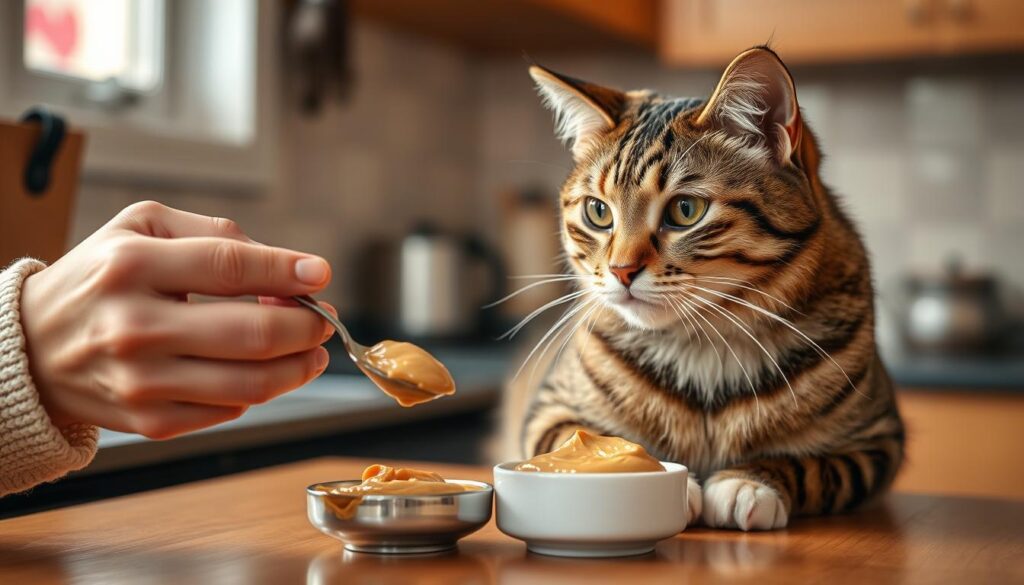
It can be hard to give medication to cats. Some people think peanut butter is a simple fix. But, vets say there are safer ways to give cats their medicine.
It’s important to know that not all human foods are good for cats. Peanut butter might seem like a good idea, but it can be harmful to cats.
- Avoid using plain peanut butter for medication
- Choose veterinarian-approved alternatives
- Prioritize your cat’s specific health needs
Vets recommend safer options for giving cats medicine:
- Pill Pockets: Treats with a pouch for medicine
- Compounded liquid medications
- Veterinary-formulated paste for pills
These methods help reduce stress for both you and your cat. They also make sure your cat gets their medicine right. Remember, not all cats and peanut butter mix well. Always talk to your vet about the best way to give your cat medicine.
Pro tip: Always consult your veterinarian before attempting any medication delivery method with your cat.
By using special tools and methods, you can make giving medicine to your cat easier and safer.
Conclusion
Exploring if cats can have peanut butter shows we should be careful. Cats need a special diet, not just what we like. While peanut butter isn’t toxic right away, it can still harm cats.
Experts say cats should eat food made just for them. Peanut butter can cause choking, has too much fat, and has bad additives. Your vet can help pick the best food for your cat.
Choosing the right treats for your cat means picking protein-rich, safe options. Look for nut-free treats that vets say are good. This way, your cat gets the best nutrition without health risks.
Knowing what’s safe for cats and avoiding risks is crucial for their health. By choosing wisely for your cat’s diet, you show you care about their well-being.

